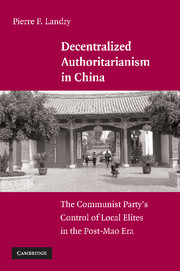 Decentralized Authoritarianism in China
Decentralized Authoritarianism in China Book contents
- Frontmatter
- Contents
- List of Tables
- List of Figures
- Acknowledgments
- List of Abbreviations
- Decentralized Authoritarianism in China
- 1 Authoritarianism and Decentralization
- 2 Organizing Decentralization
- 3 Promoting High-Level Generalists: The Management of Mayors
- 4 Organizational Power: The View from Within
- 5 Explaining Cadre Rank
- 6 The Impact of Village Elections on the Appointment of Party Branch Secretaries
- 7 Conclusion
- References
- Index
4 - Organizational Power: The View from Within
Published online by Cambridge University Press: 22 July 2009
- Frontmatter
- Contents
- List of Tables
- List of Figures
- Acknowledgments
- List of Abbreviations
- Decentralized Authoritarianism in China
- 1 Authoritarianism and Decentralization
- 2 Organizing Decentralization
- 3 Promoting High-Level Generalists: The Management of Mayors
- 4 Organizational Power: The View from Within
- 5 Explaining Cadre Rank
- 6 The Impact of Village Elections on the Appointment of Party Branch Secretaries
- 7 Conclusion
- References
- Index
Summary
Game theoretic models of politics have long established that both the nature and the quality of information available to players are critical to the understanding of political outcomes (Schelling, 1960; Fudenberg and Tirole, 1991; Rasmusen, 1989). They contrast games in which players share a substantial body of common knowledge about the structure constraining their choices, as well as the identity, capabilities, and preferences of all participants, with games of incomplete or imperfect information. Equilibria are reached with greater ease if the body of common knowledge is large and the proportion of private information is kept to a minimum.
In formal game theory, the number of players is usually small and the nature (or quality) of information among players is fixed before the game is played out: It is usually not measured empirically. However, uncovering how Chinese local officials play the promotion game requires more empirical details than stylized game theory can offer. The nested hierarchy of the bureaucracy, coupled with the high degree of decentralization of the appointment system, turns the political control of local officials into a complex principal–agent problem: A large number of agents are monitored by a multiplicity of principals who each have some authority to grant rewards (promotions) or inflict punishments (dismissal or demotion).
How do local officials seeking advancement understand this complex environment? Rather than assuming common knowledge, it is worth exploring whether the multiplicity of players of the promotion game have a shared understanding of the institutions that structure their careers.
- Type
- Chapter
- Information
- Decentralized Authoritarianism in ChinaThe Communist Party's Control of Local Elites in the Post-Mao Era, pp. 116 - 161Publisher: Cambridge University PressPrint publication year: 2008


